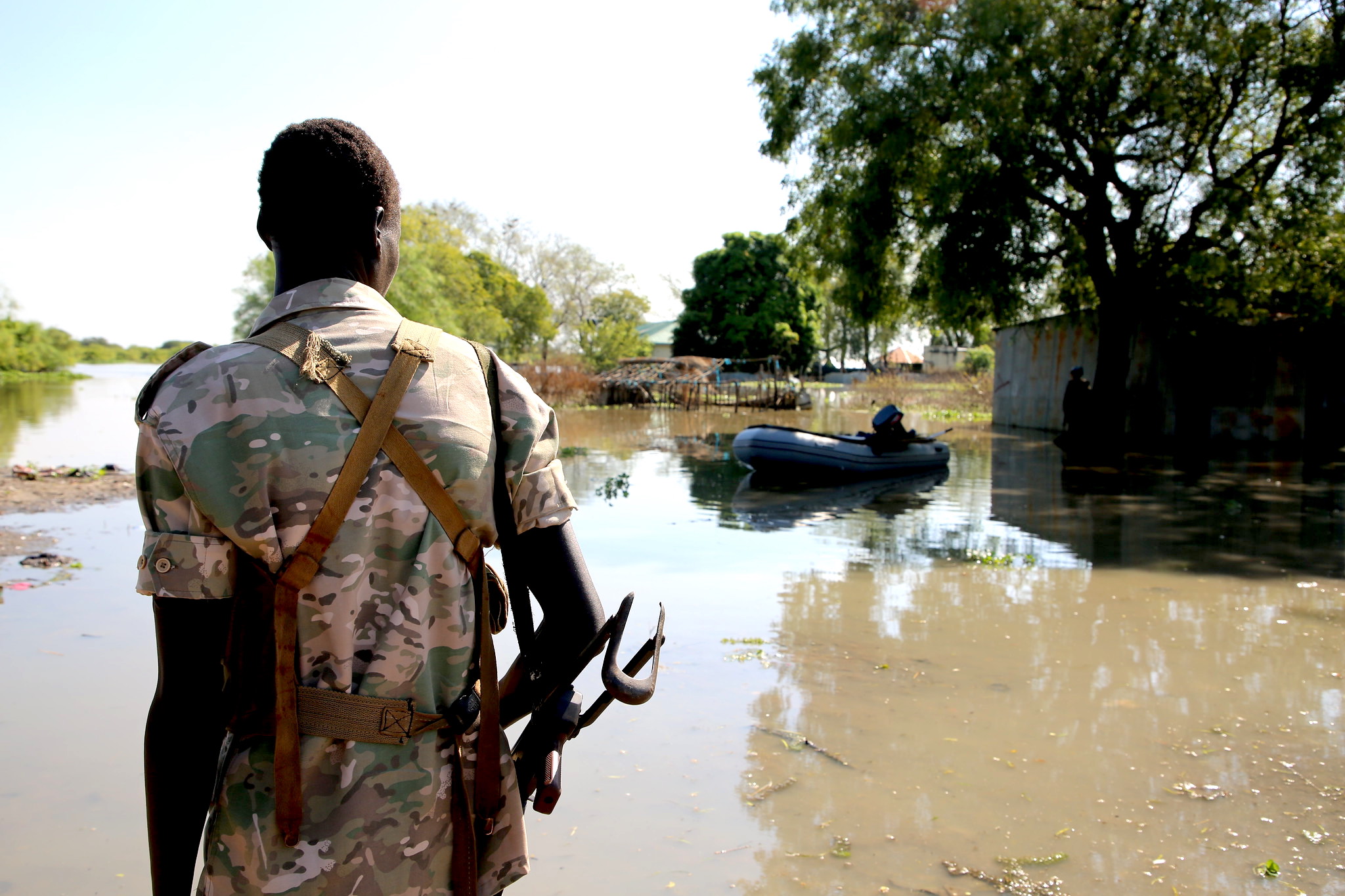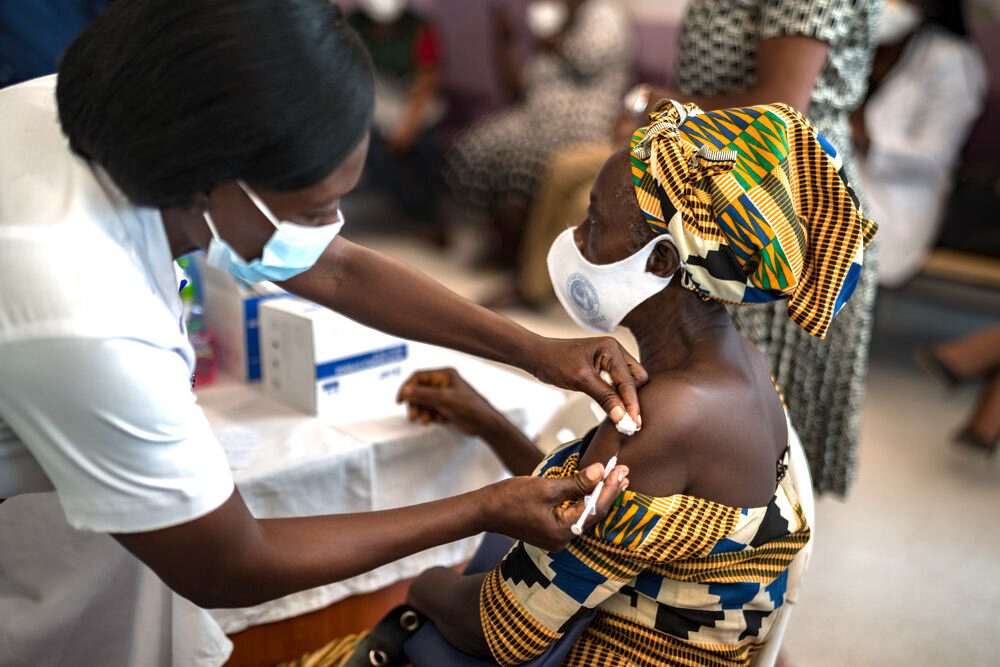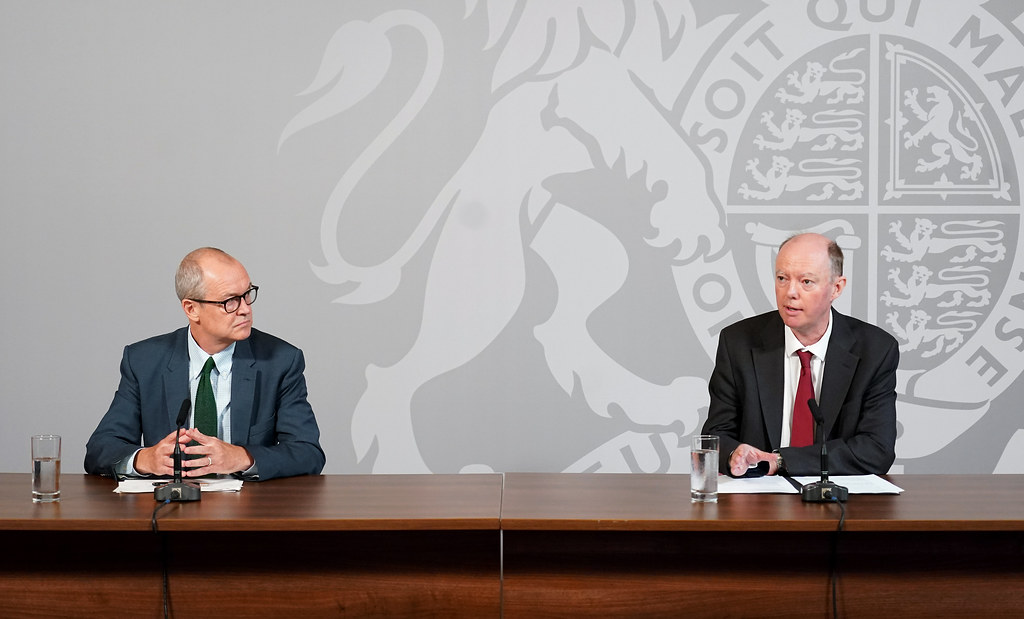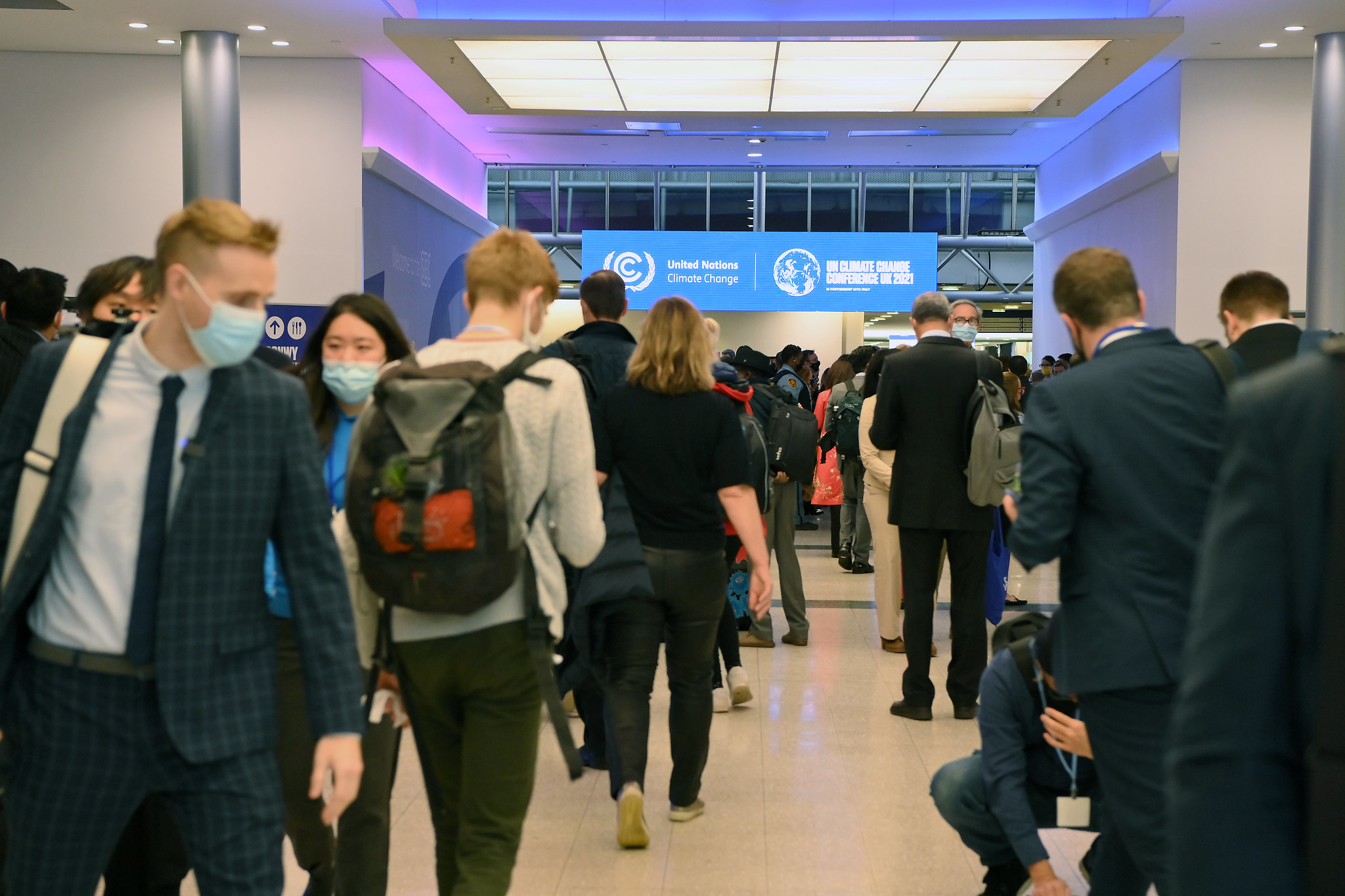Paul Rogers says the military-industrial mindset of state-on-state conflict is utterly obsolete in the face of the global threat of climate breakdown.

In September 2020 unexpected floods in Pibor, South Sudan, hindered the peace process. (UNMISS, Flickr, CC BY-NC-ND 2.0)
By Paul Rogers
openDemocracy
 Three issues arise directly from COP26. Firstly, the architects of the COP21 Paris agreement, Christiana Figueres and Laurence Tubiana, believe that yet more negotiations will have to follow COP26 next year.
Three issues arise directly from COP26. Firstly, the architects of the COP21 Paris agreement, Christiana Figueres and Laurence Tubiana, believe that yet more negotiations will have to follow COP26 next year.
Secondly, the respected Climate Action Tracker put the consequences of what had so far been agreed, both before and during the summit, at a 2.4°C rise in temperature.
Thirdly, and perhaps most daunting of all, even if a firm agreement is reached to keep the increase to 1.5°C, we are already experiencing the severity of climate change at the present 1.2° level.
The military-industrial mindset of state-on-state conflict is utterly obsolete in the face of the global threat looming from climate breakdown that can only be tackled through cooperation.
When extreme weather events such as floods, wildfires and storms affect the Global North, they attract plenty of attention. There is still much less focus on the far greater impact of extreme weather on the Global South, which is a persistent source of bitterness given the failure of richer countries to implement the agreement for $100 billion a year of support for poorer states.
Meanwhile, in what might be considered a side issue last week, but most certainly is not, Britain’s chief scientific adviser, Patrick Vallance, warned that climate change poses a much greater risk to humanity than Covid-19.
He said:
“The reason I say it is a bigger problem is because in terms of the overall effect on humanity, if this is not stopped it is a bigger, bigger challenge to the way we live, and lives will be lost.”
His view is widely shared by climate activists, but its significance increases when we take a hard look at where we are with the pandemic.
Greater Cost of Covid-19
At the time of writing, the latest figures from the World Health Organization (WHO) sat at almost 5.1 million deaths worldwide, and 251 million confirmed cases. It also reported that almost 7.2 billion vaccine doses had been delivered. However, with a global population of 8 billion, full three-dose vaccination would require nearly 25 billion doses. This is unlikely to be reached until well into 2023 — resulting in large pools of virus interacting with only partially vaccinated populations, which is a recipe for more variants.
Although the WHO is reasonably confident of its vaccination figures, it does not claim accuracy for the deaths and confirmed cases. Senior staff have agreed that the real figures are likely to be much higher. Moreover, it is currently warning of a major Covid surge across Europe, and has been consistently repeating its calls for global vaccination rates to be increased.

Woman in Accra, Ghana, receiving AstraZeneca/Oxford Covid-19 vaccine in March. (WHO)
The death rate issue stems partly from incomplete data from countries with limited health and diagnostic services. There are alternative methodologies, and one such estimate from the University of Washington’s Institute for Health Metrics and Evaluation puts total Covid-19 deaths worldwide at 12 million, which is more than double the official figures.
Another comes from The Economist, which has been running a long-term study and publishing daily figures. Its work indicates a 95 percent chance that the figure for global deaths is between 10.6 and 19.9 million, with the most likely figure within that range being 17.1 million deaths.
We are therefore looking at well over double, and quite possibly treble, the number of deaths stated in official counts. This compares with the death counts of the two greatest pandemics of the past 120 years, HIV/AIDS at over 36 million, and the 1918-19 H1N1 influenza virus (known as Spanish flu) at 50 million. However, HIV/AIDS figures are spread over four decades, and while the flu pandemic was utterly appalling given the much smaller global population, it was at a time when medical services were far less effective than today.
So Covid-19’s impact is far higher than what is commonly assumed, and there is still a long way to go. Global vaccination rates are hopelessly inadequate, yet very few governments have any clear vision for what is really needed.

U.K. Chief Scientific Adviser Patrick Vallance, left, and U.K. Chief Medical Officer Chris Whitty at a Coronavirus briefing in London on Sept. 21. (Pippa Fowles, No 10 Downing Street)
And then there is Vallance’s view that the impact of climate change will be much greater than Covid-19. Indeed, climate breakdown is likely to be far more catastrophic over the longer term — but since the global response to the pandemic hasn’t been anywhere near as effective as what is required, where does that leave hopes for climate change? What was discussed at COP26 may have been appropriate two decades ago, but now is appallingly late.
At the very least, we have to rethink what we even mean by international security. These two issues represent by far the greatest security challenges facing humankind, yet there is close to $2 trillion a year spent on the military outlays that are largely irrelevant when it comes to pandemics and climate breakdown.
Even worse is that Covid-19 is seen as peripheral to the military understanding of security, while climate change is already being securitized. Militaries thus prepare to protect their country’s population from what they perceive to be the great threat of mass migration, failing states, transnational breakdown of social order and other diverse impacts on their particular state, while arguing little, if at all, for the critical need for conflict prevention through radical and rapid decarbonization.
This old way of thinking is unfortunately not surprising, given the narrow mindsets of the military-industrial complexes that persist in every well-armed state, from the U.S. to the U.K., Russia and China.

Inside the Scottish Event Campus in Glasgow, while COP26 was underway in early November. (IAEA Imagebank, Flickr, CC BY 2.0)
For the military-industrial complexes, the working environment is one of state-on-state threats that require military responses. Frankly, that is an utterly obsolete mindset in the face of the global threat looming from climate breakdown, that will affect every country, and can only be met with globally-orientated, cooperative responses.
Any thinking along such lines of cooperation, with all that this implies, is rare in current military discourses. Just as we have failed to respond cooperatively to Covid-19, so the even greater challenge of climate breakdown has little impact on fundamental military approaches to global security.
Instead, any innovative thinking on security remains in the hands of a few small and underfunded think tanks and NGOs. In the U.K., an Alternative Security Review is being launched on Thursday by the Rethinking Security group. That is certainly a start, and there are some similar groups in other countries, such as Rethinking Security Germany. However, such initiatives are still few and far between—yet we have reached the point where they are desperately needed.
Paul Rogers is professor in the department of peace studies at Bradford University, northern England. He is OpenDemocracy’s international-security editor, and writes a weekly column on global security. He also writes a monthly briefing for the Oxford Research Group. His books include Irregular War: The New Threat from the Margins (2017) and Why We’re Losing the War on Terror (2007). He is on twitter at: @ProfPRogers.
This article is from OpenDemocracy.
The views expressed are solely those of the author and may or may not reflect those of Consortium News.

For completeness and openness can we just state that Vallance and Whitty are complete charlatans who have been caught out multiple times pedalling false information and have personally profited from covid.
The United States Spends more on it`s Military than the Next 10 Nations combined. Including Russia and China. World Peace would a
Complete Financial Disaster for Wall Street, Congress and their “Merchants of Death”. It faces NO Military Threat to it`s People what so ever. Russia and China are trying to build and consolidate their Economies. Neither wants a War with the US; Nuclear or Convential.
…but since the global response to the pandemic hasn’t been anywhere near as effective as what is required, where does that leave hopes for climate change?
Up sh..t creek without a paddle. The Covid response has just confurmed for me that we are headed for climate driven misery.
I wonder what Iran’s views are on globally-orientated, cooperative responses, instead of the utterly obsolete mindset of state-on-state threats that require military responses.